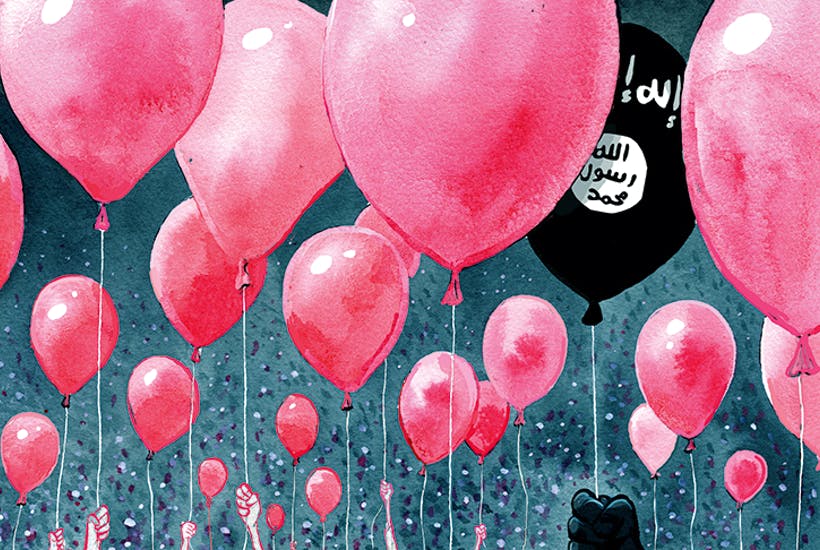They range in age from toddlers to teenagers and all will inevitably have been traumatised by what they have experienced. On the face of it, then, who wouldn’t want to show kindness to the children who, through no fault of their own, have grown up and been born in the Islamic State?
But as Commander Dean Haydon, the head of the Met’s counter-terrorism command, warned last week, diligence must come before compassion in the way Europe deals with the hundreds of children waiting to return from Syria and Iraq. ‘We look at them on a case-by-case basis and they may be arrested’, said Haydon. ‘Some terror groups are training children to commit atrocities’.
Around 50 British children are believed to have grown up in the caliphate – one of whom, JoJo Jones, was the subject of a recent sentimental report in the Sunday Times – whereas an estimated 400 French youngsters have experienced life under the Islamic State. In an interview last week, François Molins, the country’s top counter-terrorism prosecutor, spoke in similar terms to Haydon, describing these children as ‘time bombs’.
Aware that his turn of phrase would provoke controversy, Molins warned against the ‘naive optimism’ of those who believe the children and their mothers should be allowed to slip straight back into society. ‘For a long time it’s been believed that the women have been relegated by Isis to domestic duties,’ said Molins. ‘However, they’ve been involved in some operations and have learned to handle weapons. This transformation occurred last summer with women and children called to armed jihad. One cannot exclude that there will in the future be women and minors implicated in combatant roles’.
Molins said that children over the age of thirteen will be subject to legal proceedings if they return to France. But could this approach actually make things worse? It is a reasonable bet given that prison has been described by a recently-retired judge as a ‘manufacturer’ of terrorists.
Children under thirteen will be taken into care and assessed as to the extent of their indoctrination before being reintegrated into society, a task made all the more challenging because of the insidious growth of Islamism in Western Europe. A study in 2016, led by Hakim El Karoui, reported that 28 per cent of French Muslims have ‘adopted a system of values clearly opposed to those of the Republic’, a figure that rises to nearly 50 per cent for 15 to 25-year-olds. Protecting these vulnerable youngsters from an Islamist pied piper is a challenge that Moulins predicts will last many years.
That is another reason for France’s similarly uncompromising approach to the 300 or so women who signed up for the caliphate. Their policy is that all jihadists should be tried by the country in which they were caught, a stance that has infuriated some within the legal profession, who accuse the government of illegally abandoning its nationals.
Many of the women’s supporters say they are innocent victims, more often than not lured to the Middle East by manipulative men. But on the contrary, it’s often the women doing the manipulating. The late Amedy Coulibaly and Mohamed Merah, who between them murdered 12 people in two separate attacks on French soil, were allegedly radicalised by female relations.
Female terrorism is not, of course, a new development. In 1991, the British journalist Eileen MacDonald wrote a book entitled ‘Shoot the Women First’, its title inspired by the modus operandi of German anti-terrorist police. They had discovered, as MacDonald did in interviewing female members of ETA, the IRA and the Baader-Meinhof Gang, that women are ‘more ruthless, more determined and consequently more feared than their male comrades’.
But the most chilling testimony came from the Palestine women of the West Bank whose role in the struggle against Israel was to rear the next generation of PLO fighters. ‘Often I wonder what we are doing to our children,’ one admitted to MacDonald. ‘We have made them into fighters at the age of three years old…they have lost their childhood and no one can give it back’.
What was then a West Bank phenomenon is now a Western Europe one, and hardheaded realism is required by governments if the bloodshed of Palestine is not to be brought to the streets of Berlin, Paris and London.







Comments